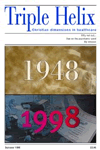This book is well-written and balanced in its approach to its complex subject. The author shows an excellent grasp of the problems facing mothers today. The book is fast moving, sometimes a narrative, sometimes a reference text packed with information. I felt that it was written for the well-educated mother especially and might not appeal to those less able to grasp pregnancy screening problems. Certain chapters would be particularly difficult to understand without some knowledge of the subject, but serve well as an excellent reference.
The book gives an honest and open exposé of the ethical issues without being prescriptive. The author takes the view, however, that there are a number of options as to when a baby attains the full status of human being. I personally think the baby cannot be any other than fully human from conception, as he or she is nothing else.
The screening tests with their benefits and hazards are well explained, especially the 'double' and 'triple tests'. There were some errors of obstetric management which were minor, and an error in the risk with regard to amniocentesis which is quoted by the Royal College of Obstetricians and Gynaecologists at a 1 in 100 miscarriage rate, and this certainly varies amongst units.
The chapter on specific genetic disorders was particularly good. A mention earlier in the book of the uncertainty of the meaning of the 'double' and 'triple tests' for people of other ethnic origins would have been helpful because they will have read most of the book before having the opportunity to evaluate properly the advice contained in it. The stories related were both relevant and poignant.
In conclusion this book will be a valuable asset to the antenatal clinic and GP surgery for staff and parents alike.
Reviewed by
Sian Kerslake
(Consultant Obstetrician and Gynaecologist, London)































